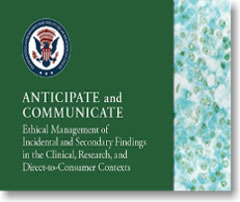
January 2014
AJR Article Helps Shape Health Care Policy
|
In the December 2013 issue of InBrief, we talked with Autumn Fiester, education director of the Center for Bioethics, University of Pennsylvania School of Medicine, and coauthor of Incidental Findings and the Need for a Revised Informed Consent Process, in which she noted that a presidential commission was studying the article as part of its research.
The Presidential Commission for the Study of Bioethical Issues has now released a report, Anticipate and Communicate: Ethical Management of Incidental and Secondary Findings in the Clinical, Research, and Direct-to-Consumer Contexts, using the AJR article as the central framework for the commission’s analysis of the issue.
|

|
December 2013

Autumn Fiester
|
Informed consent has long been an important factor in health care. Even the Presidential Commission for the Study of Bioethical Issues is studying the topic. AJR InBrief talked with Autumn Fiester, education director of the Center for Bioethics, University of Pennsylvania School of Medicine and coauthor of Incidental Findings and the Need for a Revised Informed Consent Process in the November 2013 issue of AJR, about including the possibility of incidental findings (IF) in the standard informed consent.
|
Q: Why is informed consent that does not address incidental findings insufficient?
A: Informed consent that does not warn patients of the possibility of an IF sets patients up to exaggerate the meaning of such findings. Because patients do not know how incredibly common IFs are and how few IFs will turn out to be medically significant, patients will assume the worst until proven otherwise—and that that could take weeks, months, or even years. Informed consent that includes the possibility of an IF puts these overwhelmingly benign findings into proper context and enables patients to view them with the proper perspective. Think about how a radiologist would react to an IF if s/he were the patient: The radiologist would get the proper follow-up but would lose very little sleep over it. That same perspective is what we are trying to give patients.
Q: Why might radiologists be reluctant to conduct a more comprehensive informed consent process?
A: Radiology is undergoing significant changes as a specialty, and one of those changes is the more frequent occurrence of a conventional doctor-patient relationship. There is more patient contact now than ever before. Conducting a thorough informed consent process is part of that transformation. Patients want that, but not all radiologists do. The hesitation is understandable, but patients want to talk directly to the radiologist doing their scan because they are the experts in this kind of diagnostic.
Q: How would you respond to the argument that being told of the possibility of finding IFs will upset patients unnecessarily?
A: I am skeptical that this information would upset patients if the informed consent process is expanded. If the radiologist frames IFs in the proper context, the patient should feel reassured that if there is an IF, it will likely be clinically insignificant and that no sleep should be lost over it during the follow-up process.
Q: How do patient reactions to findings of IFs differ between those who were informed of the possibility and those who weren't?
A: This is an empirical question for which we don't yet have the answer, but it is precisely the study that now needs to be done. Let's find out what works best clinically for patients so that we can be confident in setting new practice guidelines.
Do you have a story idea for InPractice?
Contact Fran Kuecker, Director of Publications, at fkuecker@arrs.org for more information.